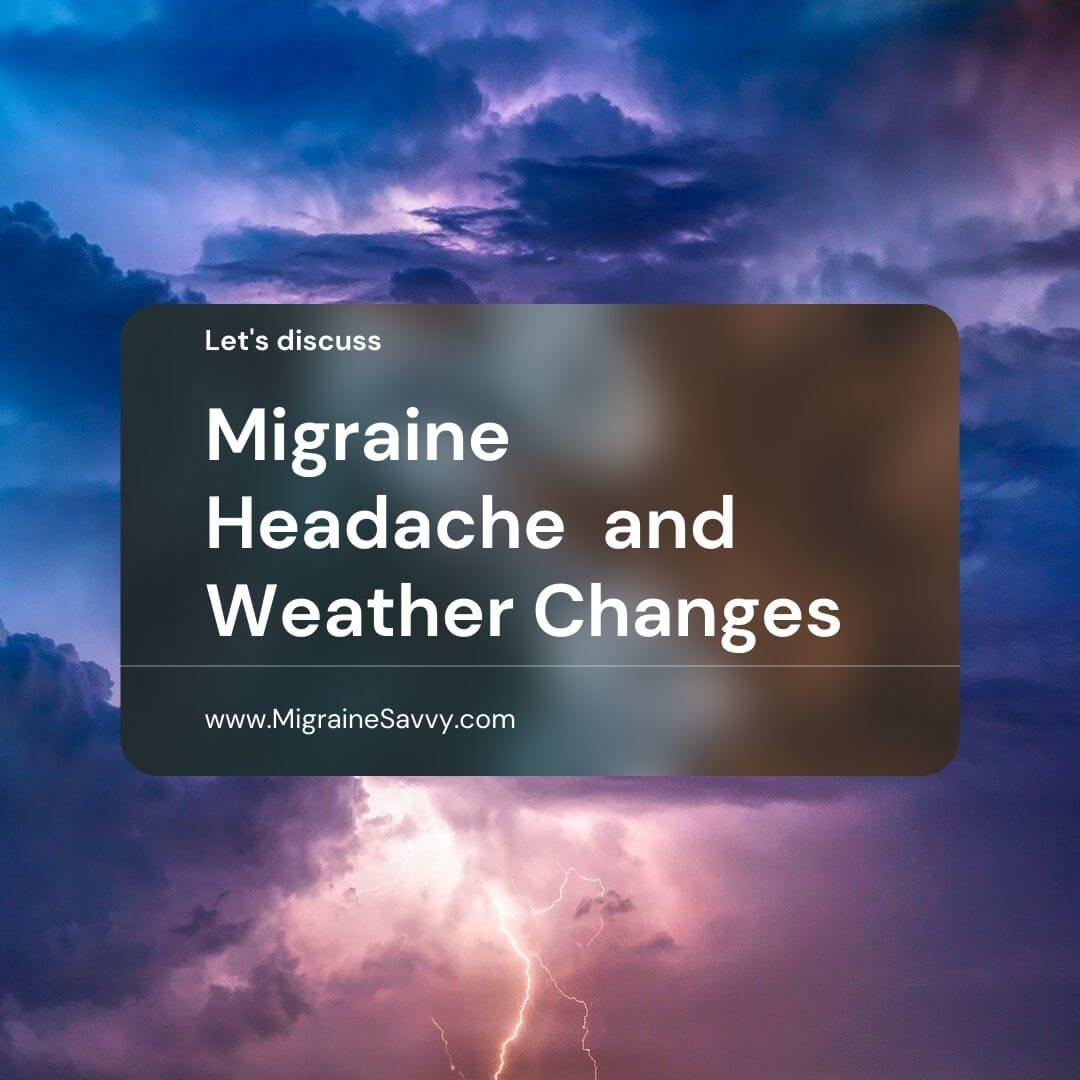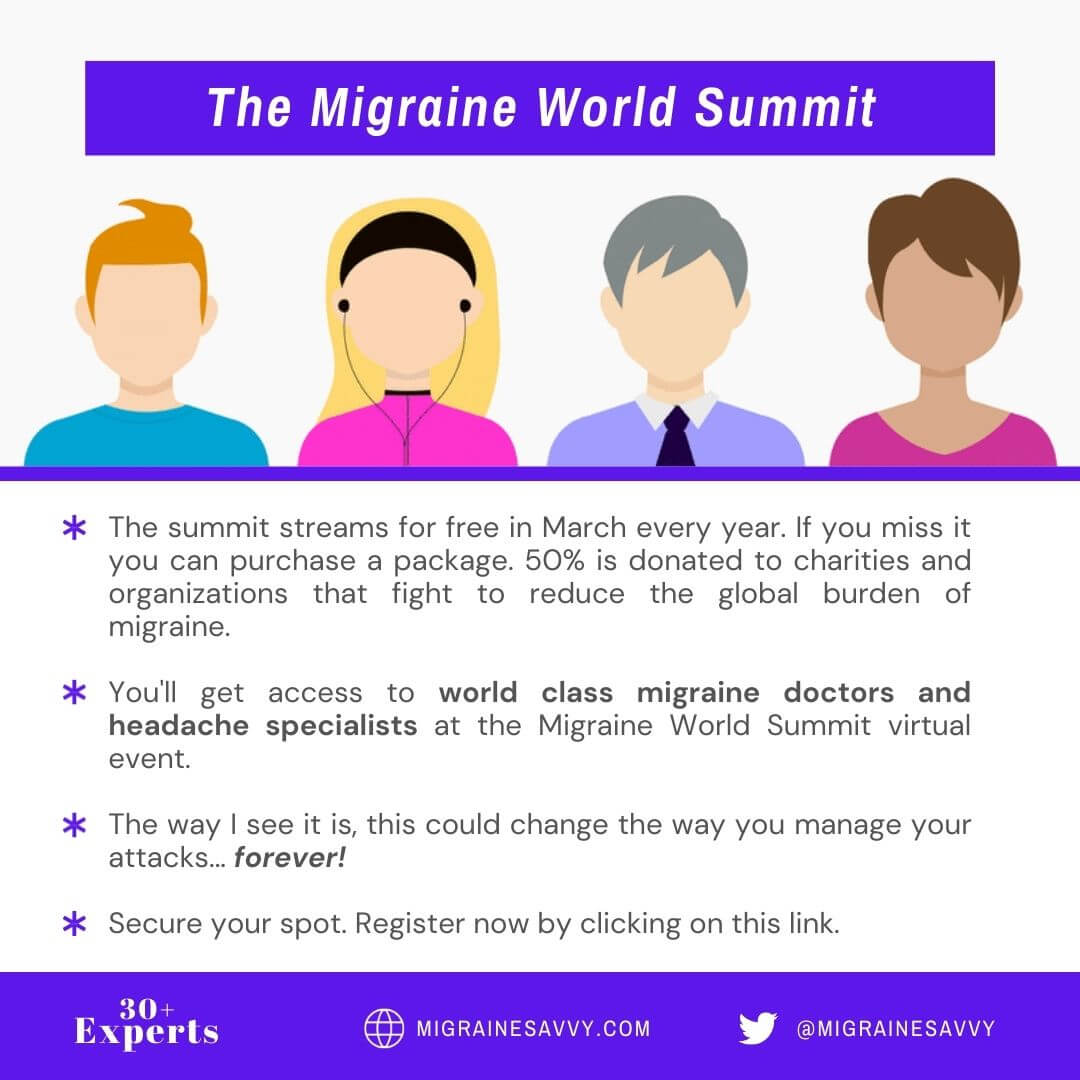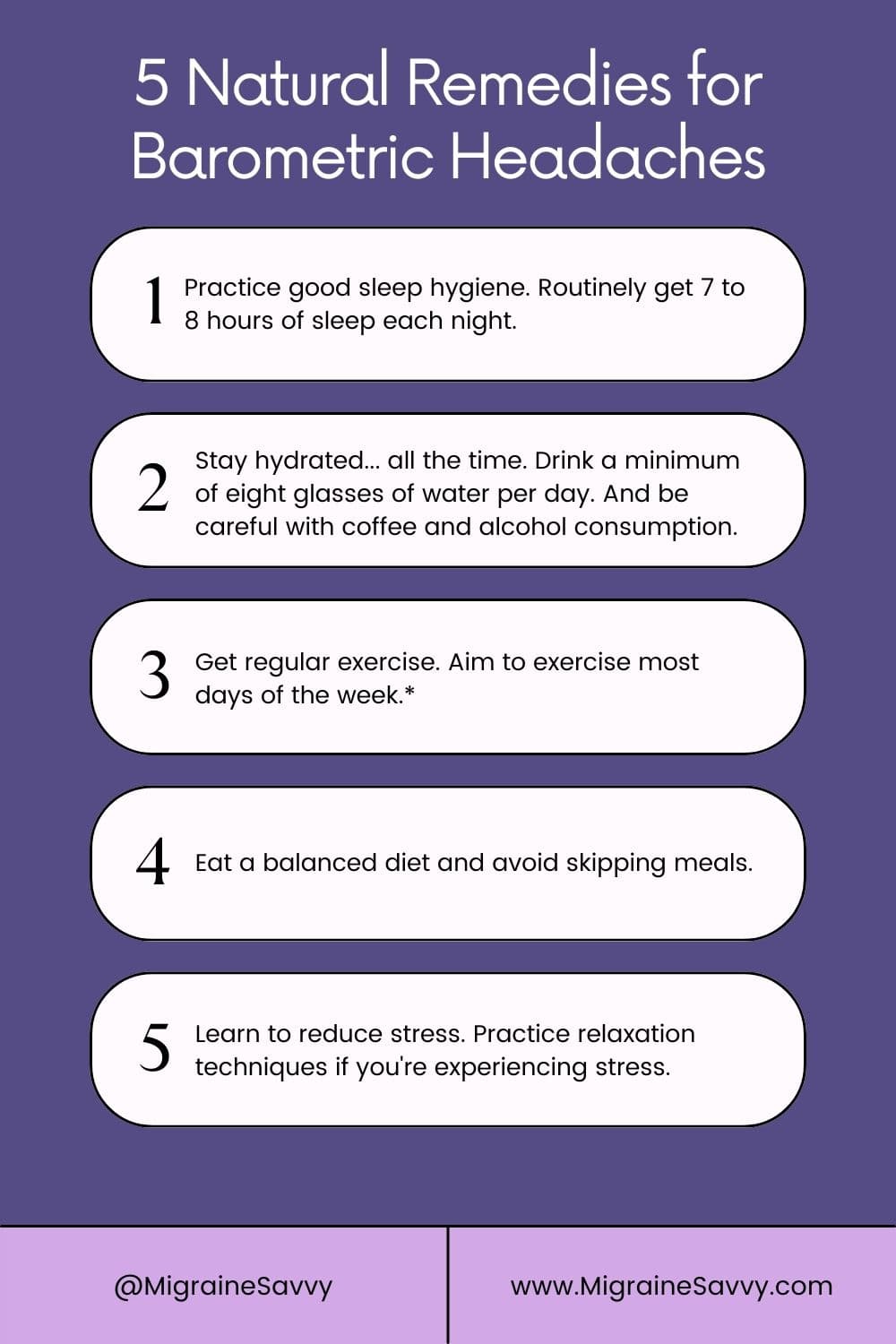COMPLETE MAGNESIUM SUPPORT
My Top Choice - Magnesium Breakthrough - The ONLY supplement with all 7 essential magnesium types in one formula. Most only have 1-2 types, leaving you deficient.
Migraine Headaches And Weather Changes
Weather Triggers and Remedies
Many of us are challenged by migraine headaches and weather changes. It seems to trigger an attack... sometimes, but not always. Let's look at why this is so (from an expert!).
First, here are the most common migraine weather triggers:
- Temperature changes
- High humidity
- High winds
- Stormy weather
- Extremely dry conditions
- Bright lights and sun glare
- Barometric pressure changes [3]
 Let's discuss migraine headaches and weather changes. Tips and remedies @migrainesavvy
Let's discuss migraine headaches and weather changes. Tips and remedies @migrainesavvy
"There is no way for us to avoid the weather, at least not our relation to atmospheric or barometric pressure" said Dr. Jan Hoffman. He was interviewed by Wendy Bohmfalk at the Migraine World Summit and here are some highlights from that fantastic interview.
Jan Hoffmann, MD, PhD is Clinical Senior Lecturer & Honorary Consultant in Neurology, King's College London.
What can we do about something that is not controllable?
Dr. Hoffman conducted a few studies about the influence of weather on migraine and he said that there is a subgroup of people living with migraine that do show correlations to weather changes (13%).
The overall group did not show this, but it is difficult to get good data from large groups because of the variables, as people are more vulnerable at different times.
So, perhaps weather alone is not enough to trigger an attack but if you are vulnerable to more triggers on a given day it may be the one trigger that puts you over your threshold.
It could be food or bright light that causes premonitory symptoms (48 hours before attack) so suddenly you eat something you are craving and then 12 hours later you get to the pain phase, and you make the connection that this food is the problem, when really the attack started before the craving for that food.
Several triggers – poor sleep, you skipped a meal or you are very stressed and suddenly, if you have two or three triggers then that’s enough.
Trigger tolerance is important – poor sleep may mean the weather will add to the accumulating triggers.
What is weather’s effect on the brain?
Dr. Hoffman talked about one study done with barometric pressure changes, done in rats, about the discharge rate in the pain conducting neuron of the trigeminal – the pain system that comes from outside and then into the central nervous system. "Mechanisms that increase neuronal activity in the rat spinal trigeminal nucleus may parallel those that contribute to the generation of headaches." [1]
This proves there seems to be a relationship between changes in pressure and in the firing rate of those neurons. There’s currently no data with temperature or humidity it’s mainly with barometric pressure where we have the data.
Does where you live matter?
Light exposure is one important aspect to consider.
Less light exposure may help migraines but may cause low mood, but then low mood may also cause the headache. So that’s tricky. You need to make sure it’s not a direct effect of light. So, no it doesn’t matter in which continent or in which altitude you live, there is no evidence around altitude.
What is the impact of barometric pressure on migraine?
High or low is not important, it’s the change. It’s the sudden change of something the body is used to from the previous days. This is a common pattern you see in migraine.
Oversleep or under sleep is a sudden trigger for example, that might lead to trigger an attack. Skipping a meal is another example. Menstruation is another. The sudden hormonal change. It’s not about your hormone levels, its about the change.
His study proved that there was no one way this triggered, high or low. There was no clear pattern in one direction.
There was no clear pattern in one direction, the rising or falling of barometric pressure, to trigger individuals. You may be sensitive to it rising or falling, but not both, so watch for this pattern.
What can be done to protect migraine from barometric changes?
This is such a difficult question. However, of those common migraine triggers, on their own, they probably cannot trigger an attack. So most people may have to have 2 or 3 triggers – and that’s now enough to trigger an attack.
So you have 5 nice sunny days and then a thunder storm, try to limit the exposure to other triggers on those days in advance, if you can.
This means to take good care of yourself so that your migraine headaches and weather changes might actually be a little more manageable.
Are there certain times of year that are worse for migraine attacks?
Wendy (the interviewer) said that a change in seasons does it for her, the fall always seems to trigger an attack.
Yes, there seems to be a mild variation in seasons where you have a lot of weather changes, and also light exposure changes. This is not as marked in migraine, not as dramatic as it is in primary headache. They don’t see as many cluster headache patients as in spring or autumn, and they have no idea why.
There were loads of other questions and great answers, but if weather is a trigger for you, you can still register here for free or buy the package here if you’ve missed the free registration period.
I do have to cover one more question... ok, two!
What medications can be used to treat weather-related migraine and headache attacks specifically?
Wendy asked if it makes sense to take a medication to prevent an attack if you know you are a weather sensitive patient.
It does not and there are several reasons for that. Weather, if it is one trigger, it is more likely to be one of many triggers. In many attacks you probably need a number of triggers to trigger an attack.
In migraine, we have the risk of medication overuse headache. We have no evidence that treating an attack before it starts, just before the weather changes, would have any benefit. “We have no evidence for that.”
On the other hand, we know that if you overuse painkillers you have a high risk of making the entire thing worse. Because migraine, at some point, becomes more and more frequent and more and more intense. And this is something we definitely have to avoid. I would not encourage patients to take a medication, or an acute medication I should say, without really having pain.
The medications used to treat weather-related migraines are the same as those used to treat other migraine headaches, with the non-steroidal anti-inflammatory drugs (NSAIDs like ibuprofen, naproxen and others) and the triptans (sumatriptan and others) being the most important medications.
~ American Migraine Foundation
Why are we sensitive sometimes but not always?
Why does our threshold change? There are certain factors that we do know. There is more and more evidence that there seems to be a natural variation that seems to be a cycle, month to month.
Hormonal changes are just one example of this. The first day many patients are very vulnerable to having an attack. This does not mean it is the only trigger, it just means they are more vulnerable to have an attack.
A fascinating thing Dr. Hoffman said was that the body does cycle through its own monthly cycle, everyone's body does this. Men too. It is not just the hormonal cycle. More systems are at play.
Another thing that has great potential to trigger another attack is the fear of having another attack. The fear having another attack may increase stress and anxiety enough for it to be a trigger itself. The fear can make it more likely to happen. (yikes!)
Another level (emotional) added to migraine headaches and weather changes.
He also suggests not to overstress certain trigger factors and not to avoid everything you come across.

Tips To Manage Migraine Headaches and Weather Changes
How to Reduce Weather Related Migraine Triggers
This is general advice but here are some natural remedies for barometric headaches:
- Practice good sleep hygiene. Routinely get 7 to 8 hours of sleep each night.
- Stay hydrated... all the time. Drink a minimum of eight glasses of water per day. And be careful with coffee and alcohol consumption.
- Get regular exercise. Aim to exercise most days of the week.*
- Eat a balanced diet and avoid skipping meals.
- Learn to reduce stress. Practice relaxation techniques if you're experiencing stress.
*Research has proven that regular, moderate aerobic exercise can reduce the severity, duration, and number of migraines in many people. Regular exercise will also help reduce stress, which is another migraine trigger.
To better manage migraine headaches and weather changes I would add:
- Keep your medications handy.
- If you do notice a pattern in your migraine headaches and weather changes, talk to your doctor about more effective prevention options.
- Diligently limit your other triggers, in advance, where possible.
- Drink more water - see proper hydration.
- Learn more about your own trigger tolerance or threshold.
So keep an eye on the weather! Monitor the barometric pressure so you can plan ahead to be extra special careful to avoid your other known triggers.
A key take away that I didn't really cover in great detail here for migraine headaches and weather changes is NOT to move house and why.
The Migraine World Summit
Don't worry... if you missed the free online event, you can still register now and get your name on the list for the next year. Or you can purchase the package here. Click on the link for more details.
Migraine Headaches And Weather Changes Refs:
1. K. Messlinger, et al. (2010) Increases in Neuronal Activity in Rat Spinal Trigeminal Nucleus Following Changes in Barometric Pressure—Relevance for Weather‐Associated Headaches? Available [online] at: https://headachejournal.onlinelibrary.wiley.com/doi/abs/10.1111/j.1526-4610.2010.01716.x
2. The American Migraine Foundation (2016) Weather and Migraine. Available [online] at: https://americanmigrainefoundation.org/resource-library/weather-and-migraine/
3. Dumas, P (2020) Weather-Related Migraines. Available [online] at: https://www.migraineagain.com/weather-related-migraines-8-tips-dodge-another-brain-storm Accessed Mar. 21, 2021




